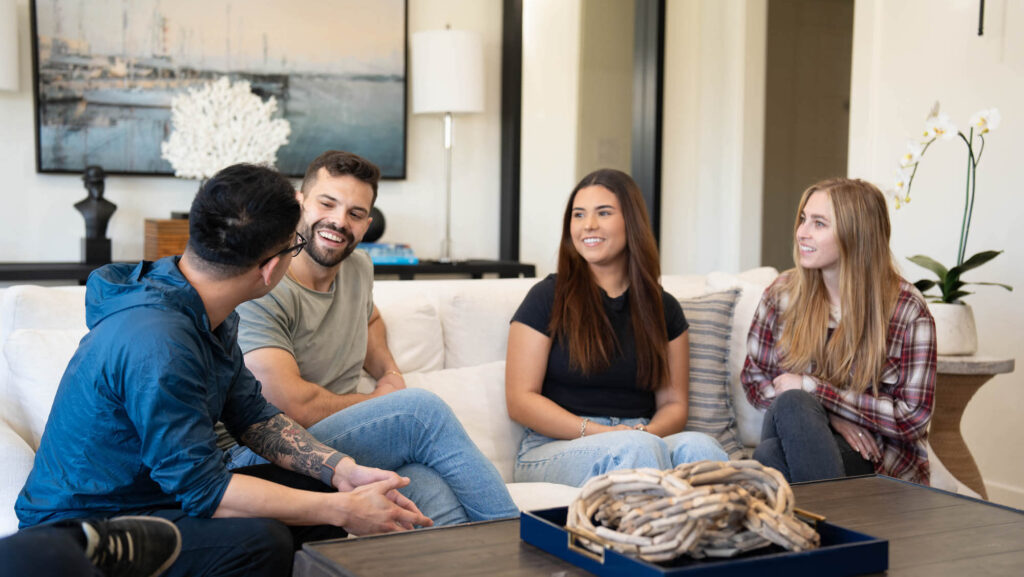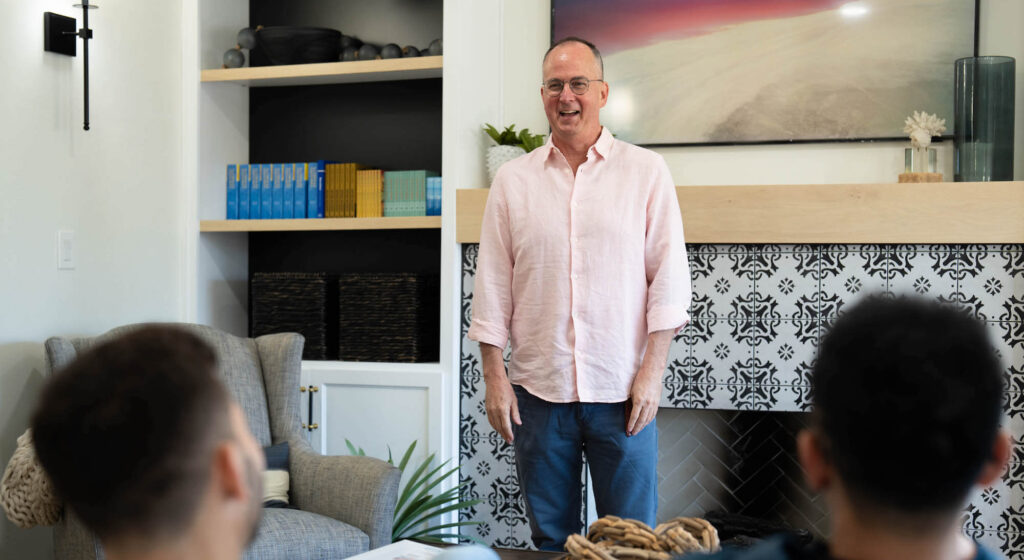People who struggle with substance abuse start their recovery journey at an inpatient treatment center for 30 days or longer in some cases, depending on their substance abuse history. Typically, patients will undergo a clinical assessment, where admissions counselors will discover what types of substances someone is using, length of use, and other relevant information. From there, the admissions counselor will assign a treatment protocol and begin admission.
Inpatient substance abuse treatment is an immersive form of residential rehab. People addressing addictions to drugs, alcohol, or prescription medications remain at a rehab center for 30 to 90 days or more while overcoming the physical and psychological side of substance use disorder.
What Is Inpatient Treatment for Substance Abuse?
Inpatient substance abuse treatment is the first step on the journey to recovery.
Inpatient rehab, also known as residential rehab, provides intensive and around-the-clock care for those struggling with substance abuse. This gives individuals a solid foundation for successful long-term sobriety by offering scientifically proven tools and treatments to ensure success long after the program ends. An inpatient program also provides a much safer and more comfortable environment for withdrawals to take place through medication-assisted treatment and 24/7 bedside care.
Although inpatient treatment centers vary considerably in their settings and amenities, the principle of delivering continuous care and support remains consistent.

7 Benefits of Inpatient Treatment
There are many benefits of inpatient drug rehab or alcohol rehab for those who require maximum support and guidance through the recovery process.
1. Structured setting
Inpatient treatment facilities provide a highly structured environment, enabling individuals in recovery to focus on their treatment without any distractions or triggers. Structured settings help people in recovery adjust themselves back into society so they can perform daily functions, and hold themselves accountable.
2. 24/7 support and care
One of the most significant benefits of inpatient treatment is the availability of constant medical and emotional support. Health professionals are on hand at all times to offer emotional assistance, manage withdrawal symptoms safely, and address any co-occurring mental health conditions.
3. Intensive therapy
Residents of inpatient rehab usually participate in a more intensive therapeutic schedule than those who attend outpatient programs. This often includes a combination of individual counseling, group therapy, and sometimes family therapy. People explore the root causes of addiction while developing new coping strategies for sober living.
4. Peer support
Being surrounded by peers who are facing similar challenges can dramatically enhance the recovery process. Inpatient programs promote a community atmosphere where residents can give and receive support, share experiences, and feel understood. This can be incredibly empowering, especially for those in the early stages of recovery.
5. Comprehensive care
Inpatient treatment centers often offer various supplementary services to support overall wellness, such as nutritional counseling, fitness programs, and holistic therapies like yoga or meditation. These services help improve physical and mental well-being, core components of a fruitful recovery.
6. Removal from everyday stress
By stepping away from their everyday environments, individuals can better escape the stresses and routines that may contribute to their substance use. This break can provide the perspective needed to make significant life changes.
7. Focus on recovery
With no external obligations to worry about, people can fully immerse themselves in the recovery process. This focused approach can lead to deeper introspection and a firmer foundation for long-term sobriety. The immersive nature of these programs helps establish a solid groundwork for a sustainable recovery.

What to Expect at Inpatient Addiction Treatment
Most inpatient treatment programs last between 30 and 90 days, depending on individual needs and the severity of the addiction. This timeframe provides ample opportunity for a drug and alcohol detox, to initiate therapy, and to start setting the foundation for a sustainable recovery. Here’s what to expect from inpatient drug and alcohol treatment.
Client Evaluation
The initial assessment involves a detailed evaluation. Medical professionals will review the person’s medical history, substance use history, psychological status, and social circumstances. This extensive evaluation helps the treatment team understand the scope and severity of the addiction, and identify any co-occurring disorders or medical conditions that need to be addressed.
Detox
The first phase of inpatient treatment often involves a detoxification process to safely manage withdrawal symptoms under medical supervision. Detox stabilizes the person, addresses the issue of physical drug or alcohol dependence, and facilitates the transition to ongoing inpatient treatment.
MAT (medication-assisted treatment)
Following detox, many treatment centers utilize MAT (medication-assisted treatment) to help reduce cravings and normalize body functions in those battling addictions to alcohol or opioids. MAT is used as a complement to other therapeutic modalities, helping to stabilize people in the early stages of recovery and also to promote ongoing abstinence.
Psychotherapy
Psychotherapy is a cornerstone of inpatient treatment, involving various therapeutic techniques to address the psychological aspects of addiction. People may participate in CBT (cognitive behavioral therapy), DBT (dialectical behavioral therapy), or variants of psychotherapy to address issues related to PTSD (post-traumatic stress disorder). These interventions help people change their thinking and their behaviors.
Counseling sessions
Both individual and group counseling sessions are integral parts of inpatient programs. These sessions help individuals explore the underpinning causes of their addictions, develop new coping mechanisms, and learn to rebuild their lives without resorting to addictive substances.
Holistic treatments
Many centers also integrate holistic therapies like yoga, meditation, acupuncture, and massage. These aim to heal the whole person by improving mental health, enhancing physical well-being, and promoting emotional recovery.
Family therapy
Family therapy sessions are often included to help mend relationships and help create a more supportive home environment after the person leaves an inpatient substance abuse treatment program.
Aftercare planning
Before completing an inpatient program, individuals collaborate with their treatment team to develop a robust aftercare plan. This normally includes ongoing therapy or participation in peer support groups to ensure continuity of care and to help maintain sobriety.
A Typical Day at Inpatient Treatment for Substance Abuse
A structured daily schedule at inpatient rehab provides the routine that many people need to help them focus on their recovery. Here’s what a typical day at inpatient rehab might look like:
Morning
- 6:30am: Wake-up call
- 7am: Morning meditation or gentle yoga session
- 7:30am: Breakfast
- 8:30am: Group session focused on topics such as healthy habits, coping strategies, or recovery skills
- 10am: Individual therapy session or medical check-ups as needed
Afternoon
- 12pm: Lunch
- 1pm: CBT or other psychotherapy sessions
- 2:30pm: Recreational therapy or physical activities like exercise, art therapy, or music therapy
- 4pm: Life skills workshops or secondary group therapy sessions
Evening
- 6pm: Dinner
- 7pm: Evening group meeting often led by a peer counselor
- 8:30pm: Free time to journal, reflect, or read
- 10pm: Lights out
This schedule can vary depending on the treatment center and the specific needs of the person. The aim is to provide a balanced mix of structured therapies and personal time to reflect and relax, promoting a holistic approach to recovery. Engaging with various types of therapies throughout the day ensures that everyone has the support they need while also building the skills necessary for life after inpatient substance abuse treatment.
Inpatient Substance Abuse Treatment FAQs
Is inpatient alcohol rehab different from inpatient drug treatment?
Inpatient alcohol rehab and inpatient drug treatment share many similarities, including structured environments and therapeutic programs. Alcohol and drug rehab often differ, though, in terms of detox protocols and specific behavioral interventions used to address the unique challenges associated with substance use disorders and alcohol use disorders.
What should I pack for inpatient addiction treatment?
For inpatient addiction treatment, pack comfortable clothes, personal hygiene products – make sure they’re alcohol-free – and any prescription medications with pharmacy labels. Take a journal for personal reflections and a book for leisure time to help you get the most from your stay.
What should I look for when searching for a good inpatient addiction treatment program?
When searching for a reliable inpatient addiction treatment program, consider the staff’s qualifications, the rehab’s accreditation status, and the availability of personalized treatment plans. All inpatient rehabs should also focus on aftercare to ensure continuity of care and minimize the chance of relapse.
Still have questions? Call our friendly recovery specialists at 800-994-2184 to learn more or begin your recovery journey.

Get Inpatient Substance Abuse Treatment by The Beach at Gratitude Lodge
Begin your recovery at Gratitude Lodge in Southern California and access compassionate and effective treatment programs for addictions to drugs, alcohol, or prescription medications.
Supervised medical detoxification at one of our luxury rehabs in Newport Beach or Long Beach, CA, streamlines the withdrawal process for those who are dependent on drugs or alcohol. Medications approved by the FDA can mitigate cravings and withdrawal symptoms, while continuous care reduces the likelihood of complications. You can then transition directly into a 30-day inpatient program.
All addictions present in different ways, so targeted treatment plans at Gratitude Lodge account for this by drawing from the following therapies:
- MAT (medication-assisted treatment)
- Motivational therapies
- Talk therapies
- Individual counseling
- Group therapy
- Family therapy
- Holistic treatments
- Aftercare support
For highly effective and evidence-based addiction treatment, call Gratitude Lodge at 800-994-2184.




























